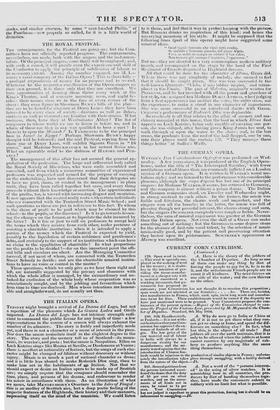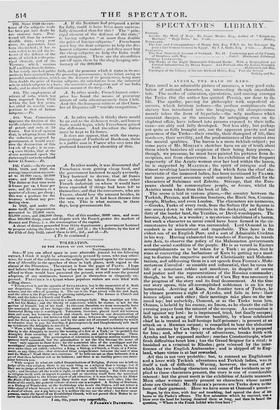CURRENT CORN CATECHISM.
(Continued.)
th to exa- mine e Project of the Customs Law, presented by M. Meynard to the Chant- her of Deputies. Standard, 9th May 1834.
dangel ous rivality for our introduction of Chinese fou- lards would be injurious to the production of similar objects in France; unfortu- nately the introduction takes place through smuggling, with a facility derived from the nature of the object.—Ib.
has not judged it expedient to grant this protection, fearing lest it should be 1111 inducement to smuggling.—D. A. Here is the theory of the jobbers of the Chamber of Deputies. As long as one of them can make any thing by dint of forcing the people to pay for it, he is to do it, and the unfortunate French people are to count it all kindness. The twist thieves on one side of the water; and the corn thieves on the other.
180. Silk Handkerchiefs, A. Why do men go to India or China at or Foulards.—It is net with- all, if it is not to get there what they can- out hesitation that your Com- not get so cheap at home, and spend the dif. mission has approved the en- ference on something else ? In fact, what trance of foulards of all on- but this, is the object of all trade? But gin. The low price of the raw material and of labour 'robbers all over the earth maintain, that it is in I only to be allowed when the jobbers at home India will always be a cannot contrive by any magnitude of rob- manufactures, and the mi.. bery to produce anything like the same noritv was of opinion that the thing themselves.
181. Several petitions from A. Not a word of the "persons interest- the persons interested mani- ed" in the using of silver watches. It is fested the desire that the duty astonishing how in all countries, the pro. of 10 per cent on silver ducers by dint of banding themselves toge- watches, and on the move- ther, have made the consumers submit to menu of all kinds not in 183. The employment of nitrate of soda, which has been imported front Chili within the last few years, has added its terrible com- petition to that of Indian saltpetre.— 184. Your Commission approves the fixation of the tariffs relative to the nitrates of potash and soda at 35 francs. 130 it is of opinion that, in adopting from 1836 the reduction proposed by government, it would occa- sion the destrnction of this Ida ich of trade ; it in curt- an q lence thinks, that at the Move mentioned epoch the duties ought DOI to be reduced below 15 francs.— lb.
185. Cattle.—In the years 1816. 1819, and 1820, the average importation amount- ed to 16,000 oxen, 20,000 vows, and 160,000 sheep. The duties at that time were 3 francs per ox, I franc per cow, and 25 centimes, or a quarter of a franc, per sheep ; this was a produce for the treasury without any pro- tecting view. In 1821, and under the lame tariff, the importation amounted to 27,000 oxen, 23,000 cows, and 246,000 sheep. Out of this number, 3000 oxen, and more than 100,000 sheep, come and dispute with the French grazier the markets of &mous and Poissy, 1. e. the consumption of the capital. A shout of distress proceeded from thirty departments ; government hastened to propose raising the duties to 30f., 15t, and 21. ; the Chambers, by the law of the 27th of July 1822, raised them to 501., 251., and 5f. —lb.
(To be continued.) A. If the Institute had proposed a prize for folly, could it have beon more success- fully demanded than for this? The "prin- cipal element of the defence of the state," is having saltpetre " at more than double the price of foreign saltpetre." Frenchmen must buy the dear saltpetre to help the dis- honest saltpetre makers ; and they must buy the cheap saltpetre to help the India trade and navigation. These ore the absurdities put off upon them by the shop -keeping aris- tocracy of the 200,000.
A. In other words, French honest enter- prise has found the means of procuring nitrate of soda advantageously from Chili. And this the bourgeois robbers of the Cham- ber of Deputies cull "terrible competition."
A. In other words, it thinks there would be an end to the dishonest trade, and honest trade would begin, while Frenchmen gained the difference. And therefore the duties must he kept to 15 francs. It does not appear, that with the excep- tion perhaps of Fonfrdde of Bordeaux, there is a public man in France who sees into the profound knavery and absurdity of this.
A. In other words, it was discovered that Frenchmen were getting cheap food, and the government hastened to apply a remedy. They hastened to decree, that 50 francs per ox should be taken from those other French industriels on whom it would have been expended if things had been left to themselves, and that the consumers, who are France, should lose the amount besides, in the same way as if it had been thrown into the sea. This is what nations, in these days, keep governments for.





















 Previous page
Previous page